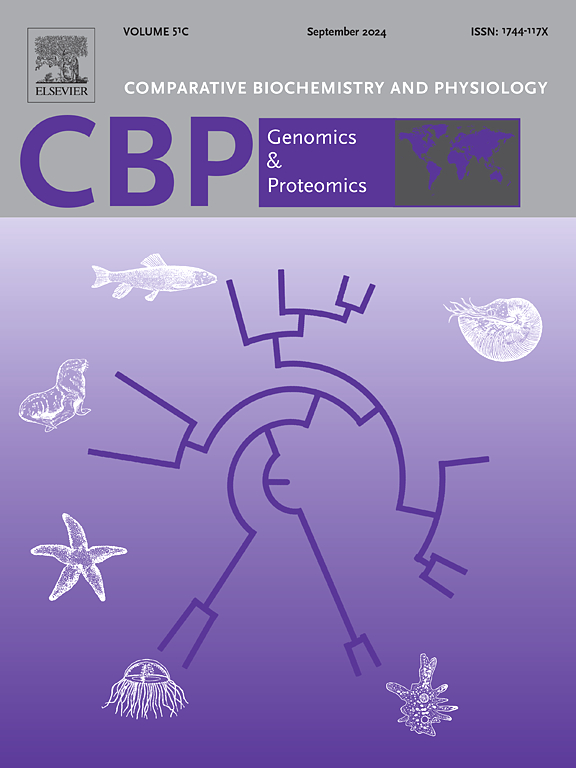Exploring the gut microbiota and metabolome of Lateolabrax japonicus: A multi-omics approach
IF 2.2
2区 生物学
Q4 BIOCHEMISTRY & MOLECULAR BIOLOGY
Comparative Biochemistry and Physiology D-Genomics & Proteomics
Pub Date : 2024-12-23
DOI:10.1016/j.cbd.2024.101408
引用次数: 0
Abstract
The intestinal microbiota plays a crucial role in the health and development of fish, engaging in intricate interactions with the host organism. As a significant species in aquaculture, Lateolabrax japonicus serves as an exemplary model for investigating these interactions and their subsequent effects on growth and health. This study utilized a multi-omics approach, incorporating metagenomic sequencing and non-targeted metabolomics, to delineate the gut microbiota and metabolome of L. japonicus throughout various developmental phases. Collected from a meticulously controlled aquaculture setting, the intestinal microbiota of L. japonicus underwent high-throughput sequencing to scrutinize microbial DNA and enumerate metabolites. The metagenomic analysis uncovered a heterogeneous gut microbiota in L. japonicus, predominantly composed of Proteobacteria and Firmicutes, with marked heterogeneity in microbial composition across developmental stages. A particularly noteworthy discovery was the prevalence of the genus Acinetobacter, which may significantly influence health and disease resistance. The metabolomic profiling discerned 4479 metabolites, each exhibiting pronounced stage-specific metabolic signatures, particularly within lipid, amino acid, and energy metabolism pathways. The correlation analysis between microbiota and metabolites highlighted the substantial impact of specific genera, such as Acinetobacter and Gaeumannomyces, on the metabolic milieu. This study provides a comprehensive overview of the dynamic shifts in the gut microbiota and metabolome of L. japonicus, highlighting stage-specific transitions that could be pivotal for refining aquaculture practices. The findings underscore the complex interdependence between microbiota composition and metabolic function, providing valuable insights into the modulation of fish health and growth.

多组学方法研究日本鳗鲡肠道微生物群和代谢组学。
肠道微生物群在鱼类的健康和发育中起着至关重要的作用,与宿主生物进行复杂的相互作用。作为水产养殖中的一个重要物种,japonicus是研究这些相互作用及其对生长和健康的后续影响的典型模型。本研究采用多组学方法,结合宏基因组测序和非靶向代谢组学,描绘了日本乳杆菌在不同发育阶段的肠道微生物群和代谢组。从精心控制的水产养殖环境中收集日本沼虾的肠道微生物群,对其进行高通量测序,以仔细检查微生物DNA并枚举代谢物。宏基因组分析揭示了日本乳酸菌肠道菌群的异质性,主要由变形菌门和厚壁菌门组成,在不同发育阶段微生物组成具有明显的异质性。一个特别值得注意的发现是不动杆菌属的流行,它可能显著影响健康和抗病能力。代谢组学分析发现了4479种代谢物,每种代谢物都表现出明显的阶段特异性代谢特征,特别是在脂质、氨基酸和能量代谢途径中。微生物群与代谢物之间的相关性分析强调了特定属(如不动杆菌和gaeumanomyces)对代谢环境的重大影响。本研究全面概述了日本沼虾肠道微生物群和代谢组的动态变化,突出了特定阶段的变化,这可能是改进水产养殖实践的关键。这些发现强调了微生物群组成和代谢功能之间复杂的相互依存关系,为鱼类健康和生长的调节提供了有价值的见解。
本文章由计算机程序翻译,如有差异,请以英文原文为准。
求助全文
约1分钟内获得全文
求助全文
来源期刊
CiteScore
5.10
自引率
3.30%
发文量
69
审稿时长
33 days
期刊介绍:
Comparative Biochemistry & Physiology (CBP) publishes papers in comparative, environmental and evolutionary physiology.
Part D: Genomics and Proteomics (CBPD), focuses on “omics” approaches to physiology, including comparative and functional genomics, metagenomics, transcriptomics, proteomics, metabolomics, and lipidomics. Most studies employ “omics” and/or system biology to test specific hypotheses about molecular and biochemical mechanisms underlying physiological responses to the environment. We encourage papers that address fundamental questions in comparative physiology and biochemistry rather than studies with a focus that is purely technical, methodological or descriptive in nature.

 求助内容:
求助内容: 应助结果提醒方式:
应助结果提醒方式:


